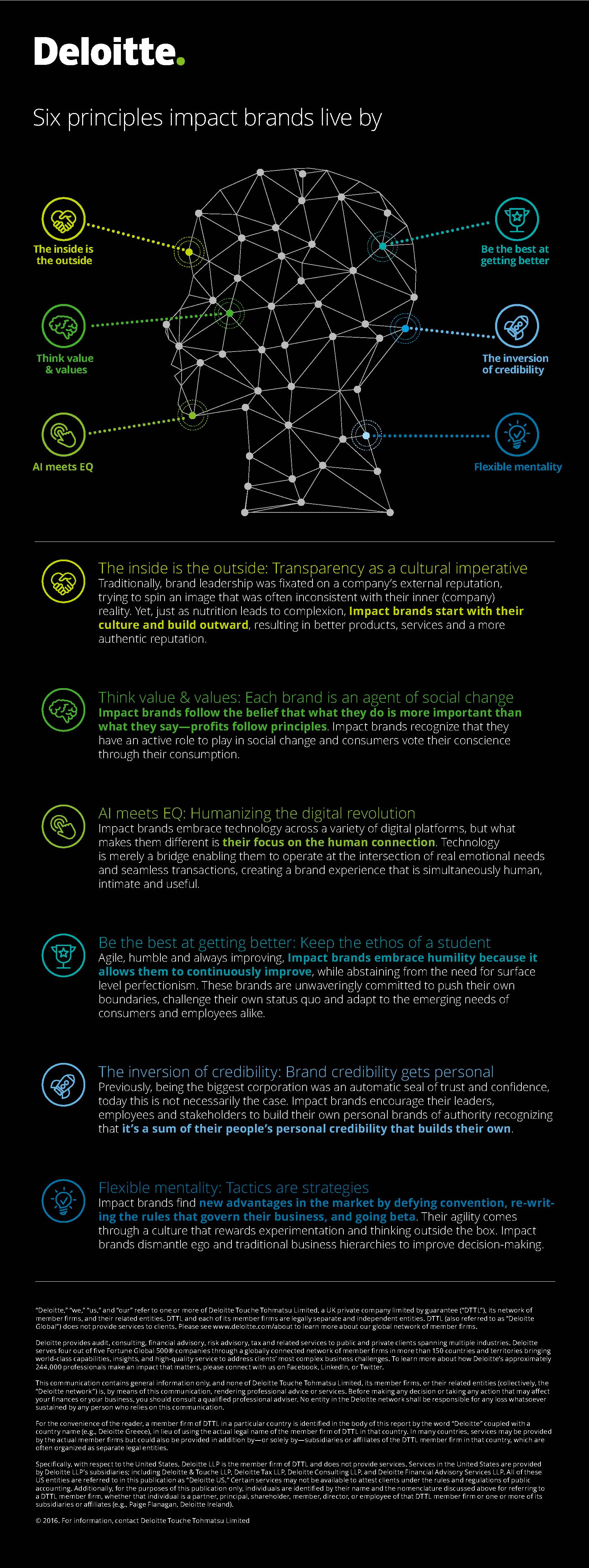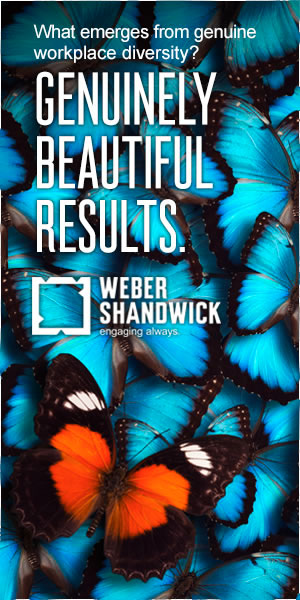Over 150 brands in 28 countries reveal the common desire to create both social and economic impact as a unifying brand leadership mantra, to drive change and build loyalty in an era of constant disruption and rising expectations, according to a recent study by Deloitte Global.
The company, which is a brand under which tens of thousands of dedicated professionals in independent firms throughout the world collaborate to provide audit, consulting, financial advisory, risk advisory, tax and related services to select clients, focused on emerging forces that now shape today’s brands in a values-driven marketplace, where disruption has shifted from technological to social to personal.
The company’s Impact Project revealed that as consumers increasingly view brands and companies as if they were human, loyalties can now change with the click of a mouse or the tap of an app.
The study also demonstrates how “impact” brands are embracing new business models and success metrics rooted in distinct beliefs (from values to transparency, flexibility to humanity) that now resonate among global consumers and stakeholders, evident among brands ranging from Audi to Warby Parker, Nike to Netflix, and Shinola to Seventh Generation, the release explained.
DIVERGE spoke to Amy Fuller, Senior Managing Director of Global Brand at Deloitte to find out more:
Can you elaborate on the 4 emerging segments?
For the Impact Project, we examined over 150 brands in 28 countries to discover how great brands are built today. Although we saw that all of the studied brands exhibited a common desire to create both social and economic impact, we are also aware that great brands can be built in many different ways based on their strengths, cultures and contexts. As such, 4 brand segments emerged from our leadership based on leadership, structure, core values and culture:
Y-prophets: This segment includes brands such as Yemeksepeti, Siggi’s, Seventh Generation and Water Gen. What we saw is that these brands are constantly asking “Why?” and tying every decision to their purpose. These brands truly believe that they can change society for the better. For example, Siggi’s purpose “bringing to life the true taste of Iceland” has been the promise of the company. Siggi Hilmarsson, the company CEO, even halted production for 3 months when production problems imperiled quality control. This means that short-term concerns about sales are no reason for letting down loyal consumers and preventing them to feel “the true taste of Iceland.”
Free radicals: This segment is composed of brands who challenge conventions and rethink everything to seize opportunities. These brands push boundaries to grow. For example, Everlane, the online clothing brand, is very open about how, where and why it sources its apparel. On their website, you can see an itemized breakdown of the raw material costs that go into producing each garment. This kind of radical transparency (their motto) is rewriting the rules of how frank and candid a company should be with consumers.
Tiny titans: These brands build success by staying intimate and small despite exorbitant growth. Small in business ethos, these companies embrace teeny team structures to keep the values alive that propelled their success in the first place. For example, Ilkka Paananen, CEO of Supercell, developed a form of distributed leadership by empowering autonomous teams, placing key power and decision-making in the hands of clusters of groups who are specialized in certain fields. In this way, a nimble, agile and innovative performance surfaces.
Re-starts: The final group is composed of the established Fortune 500 brands who are renovating themselves for the 21st century. These brands are proactively working to stay ahead of the curve by enabling the next generation of creativity and innovation. An example for this segment is Sephora, the beauty retailer, who founded the Sephora Accelerate program with the only objective of funding ten female-led, early-stage beauty startups. The company is reinvesting in these women through bootcamps, mentorship and access to Sephora’s network of beauty industry leaders and a public stage to present their ideas. By investing in their customers, Sephora keeps them close and its eye on the future of beauty.
How are brands going to continue to create social impact and economic impact? Why is that significant?
As the Deloitte global 2017 Millennial Survey revealed, 76% of Millennials believe business is a force of positive social impact, so brands are agents of social change. Leadership brands understand that they have an active role to play in society and recognize the importance of thinking of both value and values.
The brands we studied did not decouple achieving their purpose from achieving their business goals—such interconnectivity ensures a meaningful path to long-term success.
Will diversity play any role in this?
Of course. As we mentioned in The Impact Project report, impact brands have a flexible mentality: they reward experimentation, pushing boundaries and thinking outside the box. This approach is essential for brands to succeed in the modern marketplace and also for the working force of tomorrow Millennials are more likely to report high levels of satisfaction where there is a creative, inclusive working culture (76%) rather than a more authoritarian, rules-based approach (49%).
As Deloitte revealed in a study from the Leadership Center for Inclusion in 2015, Millennials see inclusion as vital to business success and believe cognitive diversity is critical to engagement, empowerment, business growth and competitiveness.
What was the most surprising out of all these results?
In a curious twist of conventional public and private spheres, we see that it is commercial brands that are effectively pushing to build bridges globally. It was very interesting to see how brands are opening themselves to the world, rewriting rules and exhibiting great transparency to their people and consumers.
Additional thoughts?
To be a brand leader, brands must learn how to think like one. Being a brand leader requires leadership, innovation (nothing new) but also, fueled by consumers, solving social problems. Do take a read of the Impact Project for inspiration.


